Kevin Clarke
Operetta Research Center
14 April, 2017
As everyone knows, operetta in its original form was a very liberated art form, in terms of sexual politics. And even though it was a heterosexual genre, through and through, it allowed room for anyone who did not wish to lead a heteronormative life. Thus, it was back in 1868 that Offenbach presented the first musical theater piece to depict the idea of a same-sex marriage. A little later, in 1882, Gilbert & Sullivan presented the first homosexual musical theater character in Patience. At least Bunthorne can be interpreted as such, even though the H-word is never spoken. After that many “nance” characters populated the operetta world, again without ever saying outright what remained a criminal offence until the late 1960s in many countries where operettas were performed and created.
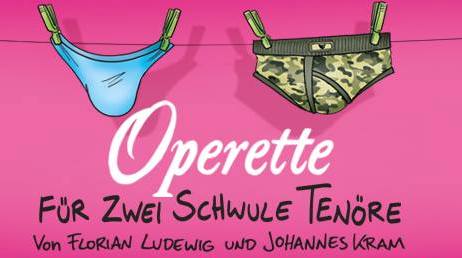
Poster for the “Operette für zwei schwule Tenöre” by Florian Ludewig and Johanns Kram.
When homosexuality became (more or less) legal in Western countries such as Great Britain, USA, Germany and Austria, operetta as an alive-and-kicking art form had stopped existing. So it was mostly musical comedy, as the follow-up genre, that tackled gay themes: first in small off-venues with titles such as The Faggot, Fairy Tales or Get Used to It, then later on bigger stages with La Cage aux Folles, Hedwig and the Angry Inch, Kinky Boots, Book of Mormon, Fun Home etc. In operetta land, the only really “out” and verbal gay characters appeared in 2006 in The Beastly Bombing by Julien Nitzberg and Roger Neill. After that? Not much. (It is indeed difficult to top The Beastly Bombing and its gay terrorists, no pun intended.)

A scene from the original production of “The Beastly Bombing.” (Photo: Kim Gottlieb Walker)
But now that the world is looking at Great Britain in 2017 with amazement at its highly visible celebration of 50 years of the decriminalization of homosexuality – with exhibitions at Tate Modern, among others places – and while the USA and Germany are battling over gay rights issues on an almost daily scale, two operettas premiered within two weeks from each another that both lift the topic onto a new level. First, at the Schwules Museum* in Berlin, Florian Ludewig (music) and Johannes Kram (lyrics/book) presented a first concert version of their Operette für zwei schwule Tenöre.
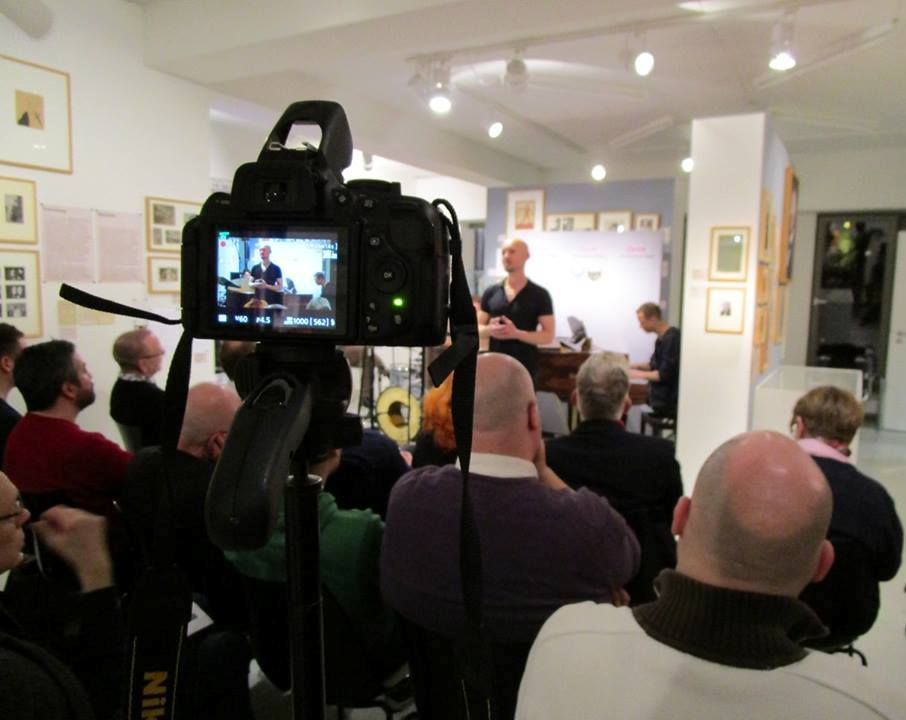
“Operette für zwei schwule Tenöre,” with tenor Eric Rentmeister. (Photo: Schwules Museum*)
It’s a charming comedy about a gay couple living in the country, until one of the men decides to pack up and leave for the big city and explore a kinkier nightlife. The fact that Mr. Kram opted for “operetta” as an art form to tell his story might be a little surprising. But he says operetta allows for more abstraction and stylization than musical comedy. It also brings together elements of nostalgia, the grotesque, and an impossible yet obligatory happy end. The music by Mr. Ludewig is certainly not revolutionary, like Offenbach was in his time. But the revolutionary aspect is that the story of the two gay men (performed by Eric Rentmeister and Daniel Philipp Witte) is shown without turning their gayness itself into a problem. It’s a natural fact among many other facts. It’s not what the show is really about, even though, in the end, it is all about that. An interesting concept.
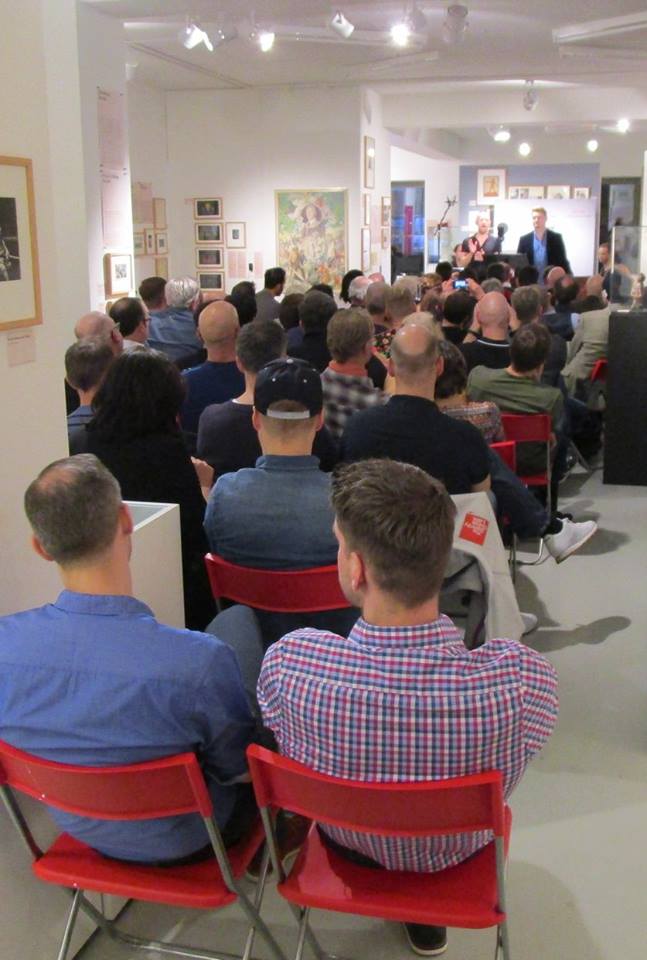
The concert performance of “Operette für zwei schwule Tenöre.” (Photo: Schwules Museum*)
Of the many songs and duets presented at the Schwules Museum*, there was a hilarious Lehár homage of “Gern hab’ ich die Frau’n geküsst” with a gay twist, there was a glorious champagne song (“Champagner von Aldi”), and a touching finale with “Ein Liebeslied von Mann zu Mann.”

The score for “Liebeslied von Mann zu Mann” from “Operette für zwei schwule Tenöre.” (Photo: Schwules Museum*)
The whole event took place in the currently running Siegfried Wagner exhibition, dedicated to Richard Wagner’s gay son (1869-1930) who was never able to express his homoerotic feelings in his musical compositions. Hearing the “Love Song from Man to Man” while seeing the many photographs and objects from Siegfried’s closeted life was a spooky experience that reminded me of how far we have come and why such a seemingly harmless Operetta for Two Gay Tenors is a political statement, even today.
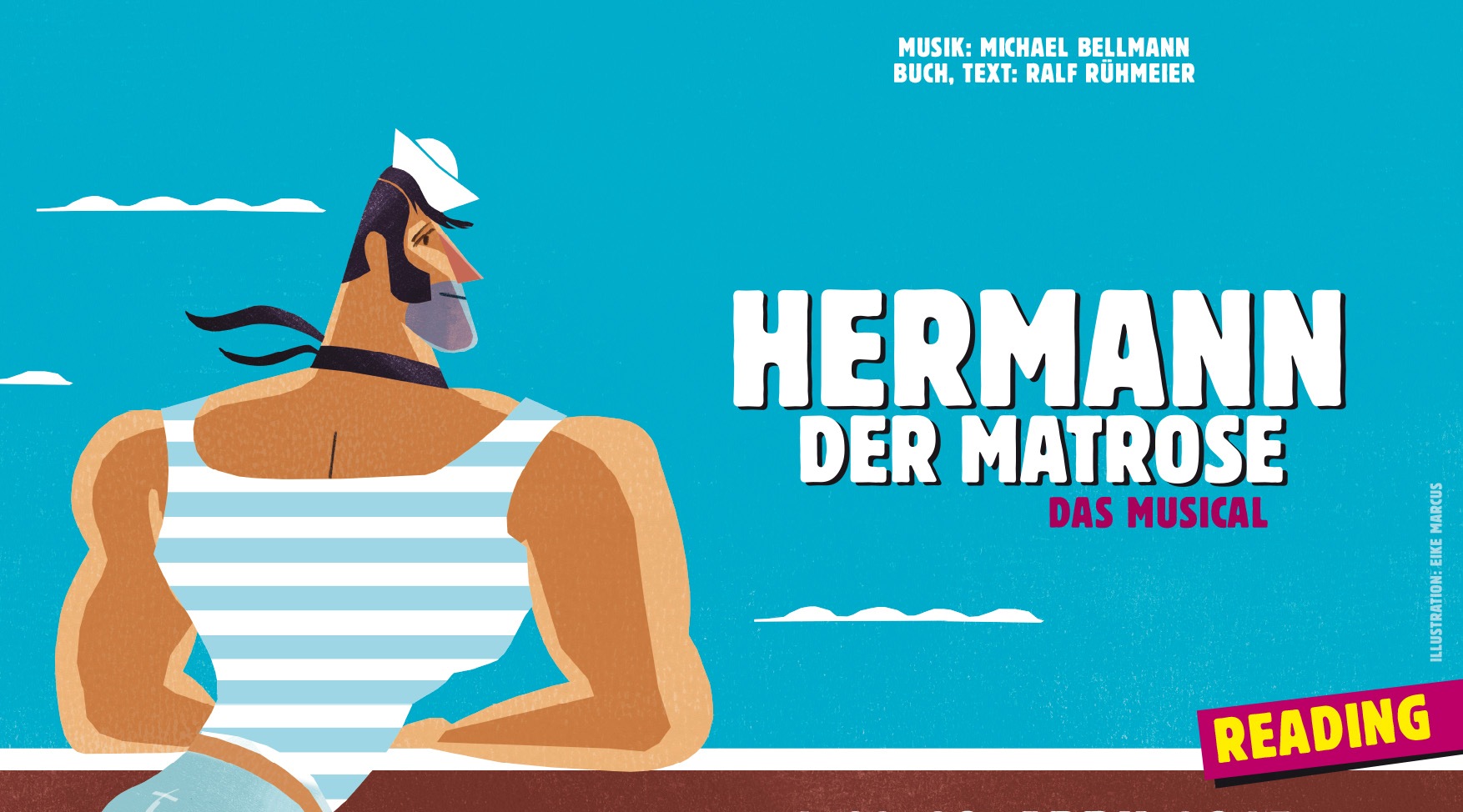
Poster for “Hermann der Matrose” by Michael Bellmann and Ralf Rühmeier.
A week later, more or less around the corner from the Schwules Museum* on Nollendorfstraße, the new show Hermann der Matrose also got a concert preview. It’s labeled “A Musical” by its creators Michael Bellmann (music) and Ralf Rühmeier (lyrics/book); but it is musically not so very different to Ludewig’s “operetta.” In both cases, the deconstructed anti-realistic story is told with consciously old-fashioned music.
Hermann is about breaking out and free, too, it’s also about obsession and fetishes, but of a different kind: young Peter has a thing for sailors, and follows his adored sailor Hermann to sea. Both end up in various surreal situation, among them a scene in a gay oriental harem that could be straight out of The Desert Song. Well… nearly. The ensemble “Fleischmarkt”, i.e. meat market, needs to be seen and heard to be believed. It re-defines the word “camp.” It also presented some stunning cast chorus boys (John Baldoz, Nikko Forteza, Pablo Martinez Garcia, Jan Rogler, Nico Stank, Samuel Türksoy).
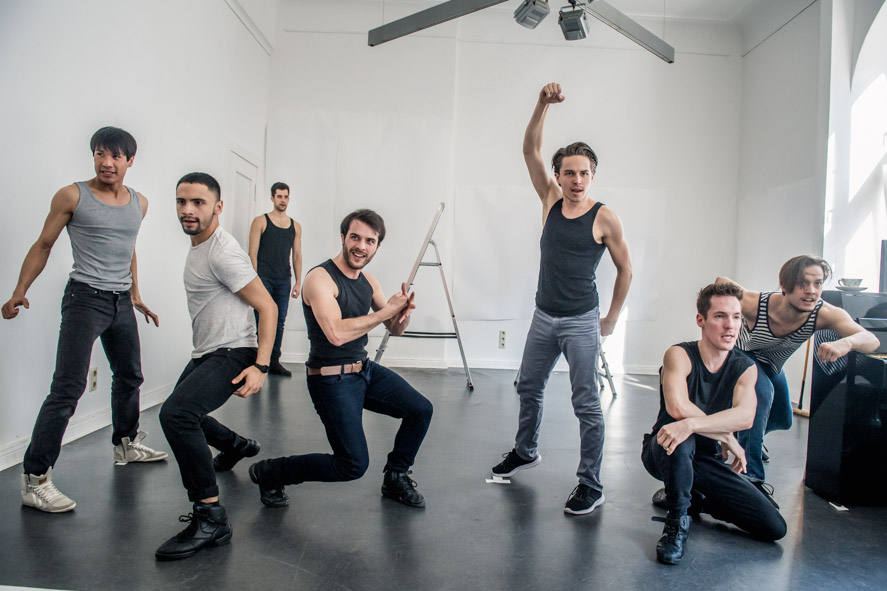
The meat market ensemble from “Hermann der Matrose.” (Photo: Benjamin Pritzkuleit)
What made the semi-staged performance in The Ballery so memorable, for me, were the amazing lead actors though. Young Swiss tenor Mathias Reiser as Peter managed to make all this farcical nonsense touching and believable on an emotional level. The chemistry between him and the towering Christian Fröhlich as Hermann was magical. Watching the two of them sing and dance together – often in expanded Ginger-and-Fred dance routines (choreography: Dominik Büttner), e.g. in the duet “Doppelpack” – made me realize what an outstanding operetta buffo someone like Mr. Reiser would be. And that there is, really, no one around at the moment on big stages who is anything like him. He’s Curt Bois and Max Hansen mixed into one. A sure bet for a big future career. With Mr. Fröhlich as an ideal leading man with ringing top tenor notes. (Add to this Lucy Scherer as the constantly interfering Heike, Arne David as the little helpful mermaid, and Rainer Sellien as Old Walter.)
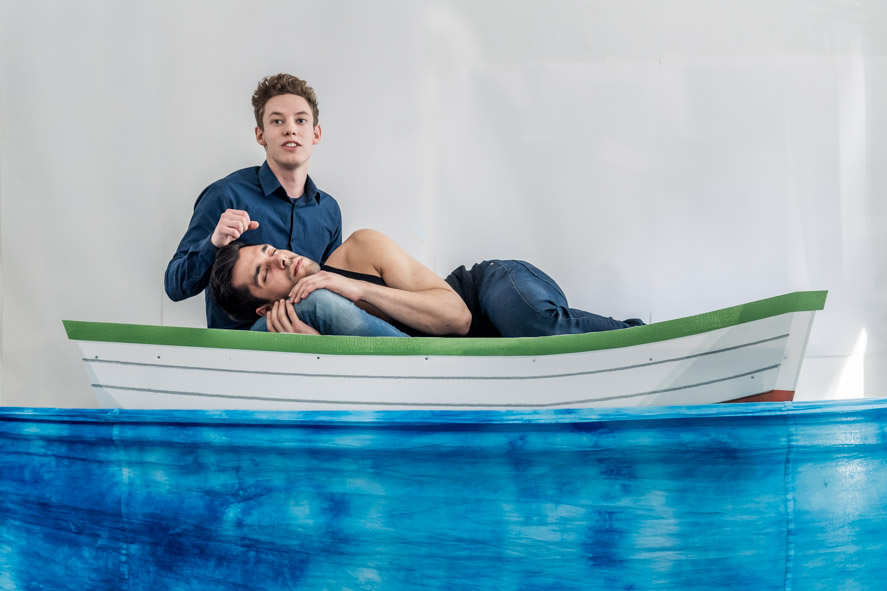
Mathias Reiser (l.) and Christian Fröhich in “Hermann der Matrose.” (Photo: Benjamin Pritzkuleit)
Whether these two shows will redefine the respective genres of operetta and musical comedy, and whether they will ever be performed on bigger stages, doesn’t concern me here. (Though I would enjoy encountering them again, especially on a cast album.) Both shows are indicators that the LGBTIQ* community has moved far ahead since Offenbach’s same-sex marriage romp Isle of Tulipatan and G&S’s Patience. And that politically engaged authors such as Johannes Kram (from the award-winning Nollendorfblog) can still find aspects in the big toy box of “operetta” that inspire them to recycle them and utilize them afresh. That alone is astonishing, and reassuring at the same time. Just as reassuring as seeing such incredible young talent entering the arena!
What’s also interesting is that as performers, writers and audiences you don’t have to be gay anymore to create and participate in such “gay operetta spectacles” these days. They are open to everyone, and they were enjoyed by all the straight and non-straight people who attented and performed and created these concert outings. Now that’s progress indeed.
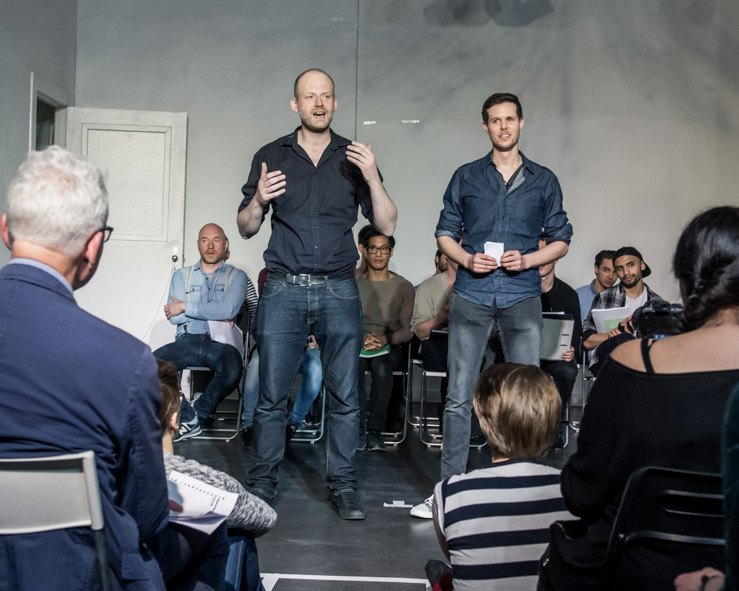
The authors Michael Bellmann (r.) and Ralf Rühmeier. (Photo: Benjamin Pritzkuleit)
